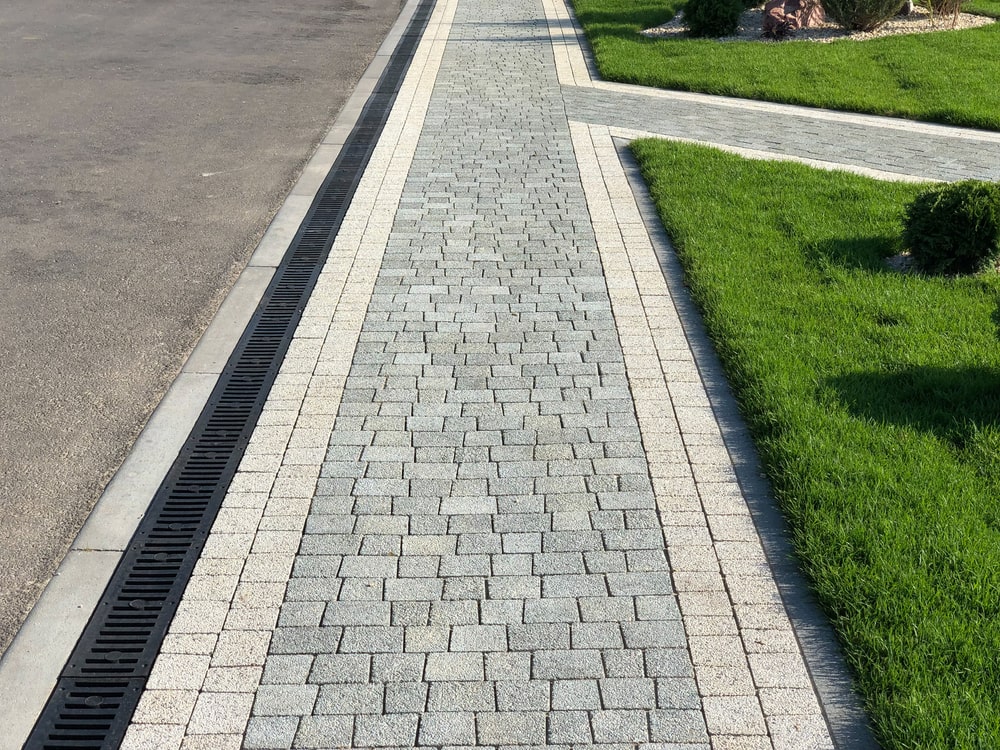
When water sits or runs the wrong way, even the best finish fails. For Concrete Driveways in Columbus, OH, smart drainage and grading planned by experienced Concrete Contractors keeps slabs flat, dry, and strong through winter. Consequently, slope, base, and joints must work together as a system.
Surveying slope and mapping water paths
First, start with a site survey. Crews check elevations with a laser, mark utilities, and map collection points on Concrete Driveways. After tear-out, they correct the subgrade. Soft clay pockets are removed and replaced with compacted 304 limestone base; where soils are weak, geotextile stabilizes the section. Next, the target slope is set to shed water toward a legal discharge. Common fixes include French drains with perforated pipe and gravel, a narrow channel drain at the garage, and downspout tie-ins that stop edge washout. As a result, water leaves the driveway rather than soaking the base.
Reinforcement and joints that control movement
Reinforcement and jointing keep movement controlled on Concrete Driveways. Many Concrete Contractors in Columbus, OH place #4 rebar on chairs along wheel paths or use welded wire in the field. In addition, a 4,000 psi air-entrained mix supports freeze-thaw durability. Control joints follow consistent spacing and are saw-cut on time, while edges at the apron and walk receive extra attention because they see the most loading and salt. Together, these steps turn a concrete driveway install into a water-managed system that holds up in Columbus, OH.
Pricing for drainage and grading upgrades
Costs vary with removal effort, footage, thickness, and access; however, drainage adds its own line items. Expect adders for French drains, channel drains, geotextile, deeper base, or regrading. For example, soil remediation in Linden or Hilltop adds labor when clay is saturated. Apron repair is priced separately because it sits in the right-of-way. Therefore, ask Concrete Contractors for a written scope listing base depth, mix design, joint spacing, drain type, and sealer so you can compare cost factors across bids in Columbus, OH.
Safety and compliance in Columbus, OH
Water crossing a sidewalk or entering the street the wrong way creates hazards and fails inspection. Columbus, OH requires apron transitions and sidewalk cross-slopes to meet standards. Downspouts cannot erode a neighbor’s lot or the public right-of-way. If the scope touches the apron, permits and inspections are likely. Moreover, choosing Concrete Contractors who coordinate reviews and understand widening rules prevents delays and keeps Concrete Driveways compliant.
Timeline that fits a replacement schedule
Most drainage and grading projects fit a normal replacement schedule. On day one, crews handle tear-out and subgrade shaping. The second day sets forms, base, reinforcement, and any drains. By day three, the team manages the pour, finishing, and timely saw-cuts. Curing runs at least seven days before light vehicles return, with full strength near 28 days. In summer, early pours and careful moisture control help. In winter, insulating blankets and air-entrained mixes protect freeze-thaw durability across Columbus, OH.
Seasonal maintenance to keep water moving
To keep details clean, start by clearing channel-drain grates. Then flush French-drain cleanouts each season. In addition, reroute downspouts away from edges so water does not undermine the base. Plan sealing every two to three years; penetrating sealers reduce water uptake on exposed aggregate, while a breathable acrylic helps a broom finish resist stains and preserve traction. Finally, inspect control joints each spring and remove weeds that trap moisture. Local Concrete Contractors can set a reseal schedule that fits Columbus, OH weather.
When to add drainage during replacement
If your old slab puddled, spalled near the garage, or heaved at the apron, correct water paths while the driveway is open. A short channel drain at the garage lip or a small French drain at a low spot provides affordable insurance. Alternatively, correcting slope by a fraction of an inch per foot can eliminate chronic puddles. With these upgrades and a solid base, Concrete Driveways deliver long service life in Columbus, OH, and your Concrete Contractors can document the results for future maintenance.
What’s next
For permit rules on apron repair and widening, continue to our next post: City Permits, Apron Repair, and Driveway Widening Rules in Columbus, OH.
FAQs
How much slope should a driveway have
A common target is about one eighth to one quarter inch per foot toward a legal discharge. Your site and codes decide the exact value.
Do I always need a drain
Not always. Many lots drain with correct grading and base. Drains are added at low points or garage lips where water cannot be rerouted.
What mix is best for freeze thaw
Use a 4,000 psi air entrained mix placed and cured correctly. Pair it with proper joints and sealing to limit water penetration.
Will drainage changes require a permit
If the work touches the apron or right of way, permits and inspections are likely. Your contractor should handle submittals and timing.
